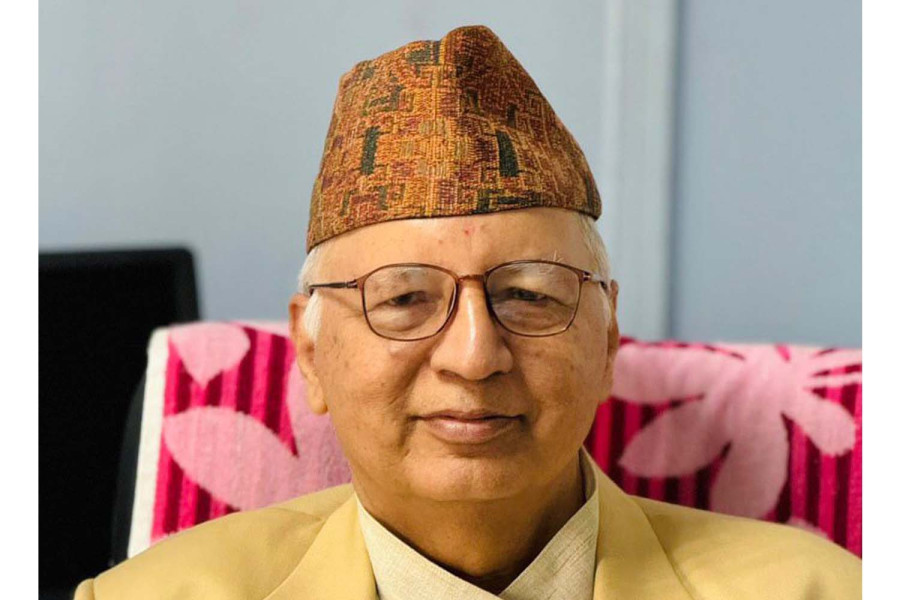Books
‘Literature shaped my judicial decisions’
Former Supreme Court Justice Ananda Mohan Bhattarai discusses the interplay between law and literature, his reading habits, and must-read books for youths.
Rishika Dhakal
Ananda Mohan Bhattarai served as a justice of the Supreme Court of Nepal from August 2016 to June 2024. Before his tenure at the Supreme Court, he held positions as a judge in various district and high courts across Nepal. Bhattarai is also the author of four books focusing on law and environmental issues.
In a conversation with the Post’s Rishika Dhakal, Bhattarai discusses the interplay between law and literature, his reading habits, and book recommendations for aspiring lawyers.
How is law and literature related?
Law and literature share an intrinsic relationship. From an academic perspective, jurisprudence, often known as the philosophy of law, includes both fields of law and literature. A saying goes, “Asal faisala asal sahitya ho,” (True judgement is true literature).
The ones who are adept in language have been able to become luminary judges. One example is the former Chief Justice of India, VR Krishna Iyer. He had an English literature background.
While law is not entirely an open-ended discourse like literature, from a literary perspective, it can sometimes exhibit open-ended qualities. The flexibility in interpretation from a literary perspective allows for changes in legal decisions over time. This is why certain legal decisions may evolve or change as perspectives and contexts shift.
How did you start reading?
When I became a literature student, my love for literature developed. I have a special inclination for the works of acclaimed poets such as Hari Bhakta Katuwal and Ashesh Malla.
My upbringing also deepened my love for reading. My brother and I used to recite Bhupi Sherchan’s poems, and my mother would recite Satyakli’s verses. It was a tradition to read the Ramayana every day in the evening as well.
I was also fascinated by the works of William Shakespeare and Francis Bacon. Among Nepali writers, the works of Samrat Upadhya and Manjushree Thapa’s ‘Forget Kathmandu’ have left an impression on me.
Why should law students read?
Reading is crucial to establishing a conceptual clarity of any subject matter. After one develops conceptual clarity, it becomes easy to analyse the matter. For instance, when one becomes well-versed in the subjugation caused by patriarchy, it becomes easier to dissect the issue within the legal framework.
A few years ago, the issue of women’s right to parental property sparked significant debate, with some arguing against granting these rights. However, when viewed from the perspective of rights and through the lens of the jurisprudence of equality, such debates become clearer and more justified. Therefore, reading and studying these perspectives greatly benefits law students.
How do you manage time to read?
When you have a demanding job, it is difficult to find the time to read. Your workload keeps you from relishing leisure activities. However, for me, there has always been a drive to read books beyond my field of expertise.
I believe time does not come in blocks, instead, it flows continuously and is experienced moment by moment. Thus, even if I get an hour or so off from work, I use it to read books.
Has reading influenced your perspective when making judicial decisions?
I have relied on information in many books, which have shaped my case decisions to some extent. One such influential book is ‘Hiti Pranali’ by Padma Sunder Joshi. The book’s well-researched content provided me with a deeper understanding of the environmental and cultural aspects of the Kathmandu Valley's water system. Similarly, Amartya Sen’s ‘Development as Freedom’ and ‘Theory of Justice’ have provided a practical framework for judicial decisions.
Which book has had the most impact on you?
Literary theories helped me understand jurisprudence from a philosophical angle. Stanley Fish’s reader-response theory and the writings of Jacques Derrida have significantly shaped my thought process in the legal field.
What would you suggest to young lawyers?
I encourage young lawyers to consider both jurisprudence and constitutional law as essential courses and to read extensively on these topics. Additionally, human rights law is an emerging field with many new areas to explore. Studying this field helps humanise the law, making it easier to become a judge by offering fresh perspectives.
For instance, understanding that “rape is not just a crime; it is an attack on the dignity of a human being” allows us to see people as human beings and respect their dignity.
When studying constitutional Law, we integrate human rights and constitutional law within the framework of rights. A strong foundation in these subjects, along with good research skills, helps law students develop an effective approach.
In our evolving system, which values comparative law, it is important to engage with various streams of thought rather than focusing on just one.
Ananda Mohan Bhattarai’s Book recommendations:
Nepali Kanuni Itihas ko Ruprekha
Author: Rewati Raman Khanal
Publisher: Pairavi Book House
Year: 2002
Rich in information and shedding light on Nepal’s political, social, and cultural dynamics, it is an insightful account of events that unfolded during the Rana regime.
Hiti Pranali
Author: Padma Sunder Joshi
Publisher: Nepa-laya
Year: 2022
Joshi’s book explores different water management systems in the Kathmandu Valley, such as stone spouts, wells, and ponds, emphasising their social and cultural importance.
Ghanachakkar
Author: Sanjeev Uprety
Publisher: Book Hill
Year: 2007
Part political and part social satire, Uprety’s book traces the journey of a government university professor whose psychology has been affected by society's political disorder.
The Idea of Justice
Author: Amartya Sen
Publisher: Allen Lane and Harvard University Press
Year: 2009
Sen highlights the vitality of recognising one’s right to understand the workings of social institutions and advocate for empowering individuals through awareness of these systems.
A Surfeit of Tribute to India’s Greatest Living Judge
Editor: PB Sahasranaman
Publisher: Universal Law Publishing Company Pvt Limited
Year: 2014
This volume contains essays about the justices who have played a pivotal role in shaping the present justice system. Readers get an insight into the lives of luminaries in the legal profession.




 9.6°C Kathmandu
9.6°C Kathmandu










